#i want to do meta. if that’s something you’re interested in
Explore tagged Tumblr posts
Text
Once i finish Tale of the Nine Tailed, would anyone want meta analysis on the Lee brothers; and perhaps, meta with their dynamics amongst other characters?
Like. I am fixated. Badly.
#destiny talks#mini ramble#ramblings#korean drama#k drama#i want to do meta. if that’s something you’re interested in#i’m going to do it anyway#tale of the nine tailed#lee rang#lee yeon#ki yu ri#nam ji ah#goo shinjoo#goo shin joo#gumiho#nine tailed fox#reincarnation#hyperfixation#can you tell im hyperfixating#im hyperfixating again
34 notes
·
View notes
Text
Cozytober Day 4: "Thank you for putting up with me."
masterpost
“Walls?” Danny prompted after another few sips. “Filtering?”
“Oh, sure. Stay upright for a moment,” Jason ordered.
He leaned forward enough to snag his work bag and rifle around for his tablet. Danny gamely stayed upright, but slumped back against Jason as soon as he could. To his credit, Jason juggled Danny, his own hot chocolate, and the table with ease.
Soon the wall’s specs were pulled up on the screen and Jason was chatting away about everything that worked and didn’t work with the current construction of the walls. There was no denying that Gotham had particular needs with freak weather changes, temperamental plants, and poisonous gases. But it was good to see Jason so excited about this start.
By the time that the mugs were long empty and Jason as running out of steam, Danny took a deep breath and it came easily. There were no more words or worries or frustrations clogging up his throat. There was just him. He closed his eyes and let out the breath slowly.
Jason stopped talking and pressed a light kiss to Danny’s temple. “Hey there.”
“Hey,” Danny said with a soft smile. “Sorry about the silent invasion. I know I didn’t exactly give you a heads up.”
“Coming home to find you in my bed is never a bad thing,” Jason said. He leaned forward to set his things on the coffee table before taking Danny’s empty mug too. “Besides, I didn’t add you to my door code for you not to visit. You’re always welcome here, boo.”
“A dangerous offer,” Danny said.
“I know what I’m getting into,” Jason replied. He pressed another kiss to Danny’s forehead before he took the mugs to the kitchen.
Danny stretched slowly. “Lies. I am a man of mystery!”
“Danny,” Jason said, giving a dry look from over the kitchen island. “You spilled being a Meta two weeks into us knowing each other.”
“I’m not a Meta, it’s a medical condition, and besides, you were so worried about me getting randomly killed on the streets of Gotham. I had to do something to reassure you!” Danny made himself get off the couch. He grabbed Jason’s work bag and took it over to where it normally hung by the door. He fished the folder out of the front pocket—work Jason would insist on doing over the weekend—and took it to the desk that sat in front of one massive window bays.
“Not a man of mystery.”
“I could have secrets! I could have lots of secrets.”
“Yeah, and what’s one of them.”
“I,” Danny started as he made his way to Jason, “would kill for your hot chocolate.”
Jason laughed and wrapped his arms around Danny’s waist. “Not a secret, and please don’t. I would be forced to cover up the murder and then various members of my family would give me that disappointed look.”
“Your family always sounds so interesting.”
“You could meet them yourself at dinner tomorrow.”
Danny froze. Danny froze and he knew Jason felt it by the the way his brows drew together and his mouth twitched almost into a frown.
“I’m sorry—” Danny started at the same time as Jason tried to say, “Forget I said anything.”
They both closed their mouths with a snap.
Danny broke the silence with a sigh. “I just… soon, okay? I just want to be… better.”
“You don’t have to be better, Danny. They’d love you just like this.”
Danny shook his head. “I just… can’t. I know you want me to meet them, but I just can’t yet. I know it’s… I know that… just…”
Jason quieted Danny with a kiss. “It’s okay Danny, when you’re ready.”
“Thanks for putting up with me.”
“I’m not ‘putting up with you’, Danny,” Jason said. “Giving you room isn’t putting up with you. I like who you are. And I know you aren’t ready, but my family would too. We’re all fuck ups, we’ve got no room to judge anyone.”
Danny gave a little startled snort of laughter. “You’re all Waynes.”
“And the Waynes are fucked up. We’ve been in Gotham too long, fucked up is part of the DNA.”
“You’re adopted.”
“Semantics.”
--- AN: Danny, poking at Jason's hyperfixation to have some calming chatter.
Gods I've missed writing these two ;-;
422 notes
·
View notes
Text
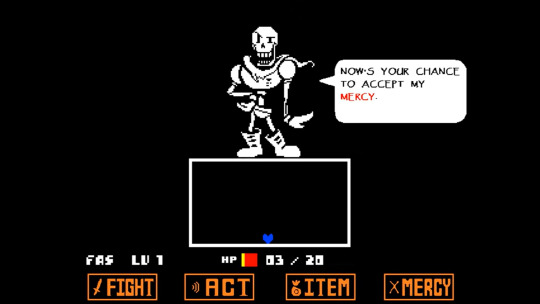
Any analysis of how Undertale deals with Pacifism and how it tries to guide the Player towards it has to take a deep look at Papyrus. Because Papyrus is the one character in the game who will never kill, the one actual ‘True Pacifist’ in the game’s main cast.
I mean, the Player can be an even bigger Pacifist. Papyrus does still FIGHT, and the Player can get through an entire run without draining a single sliver of HP. But… they can also be the world’s biggest murderbastard and literally stab reality to death.
Toriel would very much like to not kill, but she is also fully capable of doing so.

Same with Asgore, but he has a lot more actual blood on his hands. Undyne and Mettaton are both fully 100% willing to kill to accomplish their goals. Sans is non-violent in most runs because he’s too lazy and depressed to do anything, and when he is motivated into actions - it is in the form of a FIGHT to the death. Alphys… the timeline is a bit fuzzy cause both she and Mettaton love lying so much, but it seems like she did sincerely add deadly weapons to Mettaton cause killing humans would make him more 'useful' and then had second thoughts once she developed a parasocial relationship with the Human Child and THEN she and Mettaton started hatching their little play-acting plan. I think??
With Papyrus there is NONE of this ambiguity, we know for sure - no matter what timeline or what may come - The Great Papyrus will always choose MERCY.
And the interesting thing about that is on a Meta-Sense, Papyrus is a very rare example of the game giving MERCY towards the Player.
Because the game starts out being really obtuse with the Sparing mechanic and how it works. If you want to be a Pacifist in Undertale from the get-go, you’re gonna have to work for it. You're gonna have to figure it out on your own and commit to it and believe that it's possible. It's basically a test of your own belief in non-violence and your moral integrity. Then, the RUINS end with the Toriel boss battle - in a way, that’s probably the hardest Sparing puzzle in the whole game. And it’s very very easy to accidentally kill her. (I’d almost say that’s the intention of the battle, to try to goad the Player into Resetting so they can see how the game remembers across RESETs)

And then we have Papyrus, and it’s not just that his ‘Sparing Puzzle’ is something as simple as outlasting him and letting him run out of dialogue - and it’s not just that he’s the only boss that will just give up and let you continue if you lose to him enough times. it’s also that, just as Papyrus is the only boss incapable of accidentally killing the Player - he’s also the only boss that the player is incapable of accidentally killing.
(Okay, fine, to be pedantic, there’s also Asgore)

I mean, the Player can certainly kill him if they want to - but draining Papyrus’s HP just makes him skip through his battle dialogue right to the end of it. It’s designed in such a way that, no matter what Route you're on and no matter what approach you take with Papyrus - you will always end up on this screen.

Unlike basically any other Monster in this game, including the major boss battle just before him - you can’t kill Papyrus accidently. You can't kill him without also having Sparing him as an option. The game kinda treats killing Papyrus as one of the Worst Things You Can Do because killing Papyrus will always be a deliberate, considered action done to a person who will not kill you and who has stopped wanting to FIGHT and has extended a hand of Mercy. With the game clearly communicating what you need to do to Spare him at that moment.

And that means that - even if you killed before, even if you don’t have the patience of a True Pacifist, even if you spent all this time in the game without even trying to engage with the Sparing mechanic… as long as you don’t want to be a Huge Rat Bastard, the game is basically gifting you with the very very easy option to not be. Being a Pacifist in Undertale is usually a challenge - a puzzle to be solved, a test to pass. But as long as you aren’t intentionally trying to be the Worst Person - the game is basically giving you Papyrus.
If you accept his Mercy, you are accepting the game’s Mercy. That sort of benefit-of-the-doubt assumption that maybe all of the LOVE you might have accumulated so far was all due to honest mistakes or panic or an attempt in self-defense. That you still deserve this one chance to prove that you are not intentionally, maliciously cruel - or at least not like the Worst Person in the World. Even if you did kill before, you still deserve at least one friend.
And Sparing Papyrus leads you to his wonderful Hangout/Dating Sequence and to his Phone Calls and they all add so much wholesome charm to the Undertale experience and no matter what happens Papyrus will always think the best of the Player and he will always trust them and it also makes Sans also kinda your buddy by default. And more than just adding a little bit of wholesome charm into even the more LOVE-filled Playthroughs, I think this is meant to try and incentivize these players into trying out the Mercy mechanic a bit more.
Whatever it’s, like, for future playthroughs or Resetting the game right there to try a True Pacifist Run right there and then or just trying to be a little kinder for the rest of this current playthrough - especially since there’s an emphasis about the close friendship Papyrus has with the upcoming boss Undyne, and to a lesser extent with his idol and next-next boss battle Mettaton. It’s like “well, if you didn’t figure out how to spare before, this is how you do it? And isn’t it nice to have a friend? Isn’t it nice to not have to kill this lovable skeleton man? You should do this more often wink wink nudge nudge!”
And it’s like… all of Papyrus’ loved ones care about him so much but they also look down on his pacifism. They see his inability to kill and desire to make friends as simple naivete and that’s why all tend to hide the truth from him all the time. About what will happen to the Human he will capture, about what his new Human friend might’ve done, about the fact that they view him as so naïve.
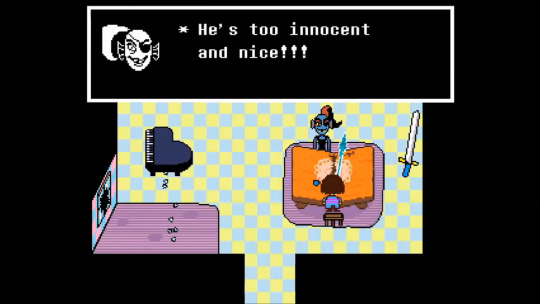
They admire it on some level, that’s why they want to protect it, but they also see it as a weakness which is why they want to protect it by lying to him all the time. But, you know, Undyne says that if Papyrus goes into battle he’ll be ‘ripped into little smiling shreds’ and that is certainly what happens every time a Player chooses to refuse Papyrus’ Mercy and the game’s Mercy and press that FIGHT button…

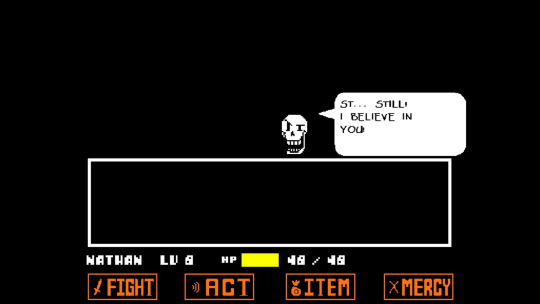
But have you thought about all the times that doesn’t happen? All the careless or violent players who were offered that skeletal hand of friendship, accepted it and then carried that offered kindness forward for the rest of the game? All the players motivated to do good for the sake of their buddy Papyrus? All the Murder Routes stopped because the player just didn’t have it in them to kill someone who believes in them so earnestly?
Like, no, it’s not a surefire thing - especially since Papyrus has so much less narrative power than the Actual Unkillable Time God that is the Player. But it happened, and it happened many many times to many players. Papyrus offered Mercy, the game offered Mercy. And much like Frisk’s Pacifism, it comes from a place of seeing the honest goodness in your ‘enemy’ and can inspire them to become a better person - this little sparkle of goodness being passed forwards.
And I think that’s beautiful, even if it didn’t happen in every timeline. Any potential future where Papyrus’ kindness can have such an effect on the Player and thus the entire trajectory of the Underground validates his kindness and pacifism on some level - even if there are also always the potential worlds that it backfires completely.
And there’s also one other way in which the Great Papyrus Proves Pacifism Pays. One that is a bit more practical, perhaps. And one that Papyrus himself is not even aware of.
Papyrus’ boss battle can be a surprisingly challenging one specifically because he is the only one who doesn’t kill the Player.
Like there is a reason why Papyrus will just offer you to skip his Fight after you lose to him three times, because if he didn’t do that - there’s an honest risk that the Player can get stuck in a much stuckier way than anywhere else in the game.
Because, like, for basically any other character in the game, being killed is the Worst Thing that could ever happen to them. For everyone except the actual Player Character because we are an Actual Unkillable Time God and dying is nothing more than a minor annoyance that sets you back to your last SAVE Point. So, leaving aside Papyrus’ admirably kind intentions - there is not much material difference from the Player’s perspective between getting Captured and getting a more traditional GAME OVER. Except…
Except getting Captured does not undo everything that happened in your inventory during the battle. In every other Undertale battle, if you use all of your items but still lose - the GAME OVER at least means you get your stuff back. But because Papyrus doesn’t kill you, any healing item you’ve used during the battle is still used. I have watched so many Undertale Let’s Players waste all of their valuable items on their first Papyrus battle and then have to face him again without them and thus do even worse in their second go… and then their third go... and thankfully then Papyrus offers them to skip the fight.
And while that technically can be circumvented by just manually closing the game and opening it back again on their pre-battle SAVE Point, a lot of players are gonna reflexively Save over it if they pop over to the Shop or the Snowed Inn before their second attempt at the battle. If Papyrus didn’t offer that chance to skip his battle, it could’ve easily become a softlock situation for a huge chunk of players - because he doesn’t kill the Player.
Most of Undertale deals with the value of non-violence from a standpoint of morality and kindness and personal connections. Since most people do die when they get killed. But when dealing with an Unkillable Time God like the Player, Papyrus proves that not-killing might actually be the most practical solution.
Of course, it doesn’t seem like Papyrus is aware of any of this. From his perspective, he is just offering genuine mercy to a being just as ephemeral as he is. But it accidentally turned into one of the most effective methods of blocking the Player’s way… at least he didn’t offer us an opt out so soon after that.
And it’s interesting when comparing him to how his brother Sans - one of the few people actually aware of the existence of SAVEs and RESETs - deals with the Player. Because the Sans boss battle at the end of the Murder Route is entirely based on the concept that death is nothing but an annoyance to the Player. Sans is less trying to kill the Player (the way Undyne the Undying did), he is simply trying to annoy the Player into a ragequit. But he is still killing the Player.
Now imagine a Sans battle where he has all of his usual annoying tricks, but also instead of killing you - he captures you just like his brother would’ve in a happier timeline. And while it’s not a fool-proof plan to stop the Player in their tracks - he could very easily stick them in that sort of softlock situation where they have to battle him again and again without any Healing Items. Forcing them to either abandon the game or RESET the whole world back the way it was - just like Sans wants them too.
But instead, by killing the Player, he is just allowing that perfect second-third-fourth-fifth-sixth-try where they get all of their Stuff back. And he does actually knows that. And why doesn’t he do that? (Speaking here from an in-universe character study perspective. Obviously the Doylist answer is that the game doesn’t want to Softlock you even in the most deliberately-frustrating part of the game).
Maybe, even though he intellectually knows that killing the Player will be of no help - he still does it because he wants to. Because he just wants to get back at the evil murderous monster that took his brother from him and destroyed his entire world even if he knows it’s actually ineffective. And this thirst for bloodshed is, ironically, blinding him from a new exciting way to actually practically stop that murderous bastard who is themself motivated entirely by bloodshed.
Maybe he just can’t do something like that. Reducing an enemy to exactly one HP and then stopping is not a feat anyone else in the game is capable of pulling off - even the ones who would obviously use such a thing (like Toriel or a Player with a Pacifist intentions). Maybe it’s something that requires a lot of hard practice and discipline and carefulness, that Sans never thought to put in because he didn’t see it as a useful skill the way Papyrus did.
Maybe that wouldn’t have worked anyways. After all, and that’s something I kinda touched on in a previous Overly Long Rambly Hot Take - Sans’ War of Attrition against the Player is greatly helped by the fact he can’t remember every single previous try and so he can’t get exhausted the way the Player can get. Obviously, without a GAME OVER induced RESET that will not apply. Which is especially notable because… Sans’ laziness is literally what brings him down at the end of that Boss Battle.

So maybe, while Papyrus, as long as you decline his offer to skip the battle, is capable of offering just the same Battle as before over and over and over again.... It’s possible that Sans just won’t be able to pull off two or three or more battles of the same intensity and difficulty in a row without a RESET to undo his own exhaustion.
But I think it’s at least worth considering the option, y’know? That after all this time of viewing Papyrus’ kindness as sweet-and-yet-kinda-foolish-naïveté - that exact viewpoint made Sans overlook the perfect solution to dealing with his little Murderous Time God problem. Cause he just never considered that while killing might be fully morally justifiable in this situation and very very satisfying, that does not necessarily mean it is actually the most practical solution. And that maybe, in a weirdly twisted way, Pacifism WAS the answer.
#undertale#ut#utdr#under tale#papyrus#the great papyrus#papyrus undertale#papyrus ut#sans#sans undertale#sans ut#sans the skeleton#papyrus the skeleton#undertale analysis#undertale meta#genocide route#genocide run
2K notes
·
View notes
Text
Romantic expectations and the story we didn't see: A magic trick hiding in plain sight
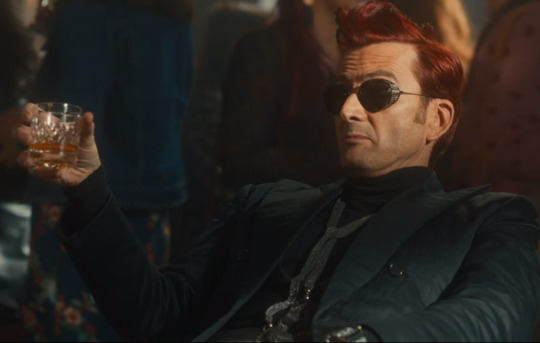
Here's a hopeful meta for all my fellow celestial brainrot sufferers out there. Cheers! :)
This idea started as a dead end, trying to track the movements of Crowley’s sideburns/tattoo because I thought time travel shenanigans were afoot. I had to abandon that theory when it was pointed out that David was simultaneously filming as the sideburns-having Fourteenth Doctor, and in-universe Crowley can do whatever he wants with his facial hair whenever he feels like it. But hey - null findings are still findings!
On the bright side, pausing the show to make notations in a spreadsheet forced me to slow down and notice other changes I'd overlooked the first time around: acting choices, costuming choices, references to book lore. And possibly a few surreptitious flicks of the wrist, in places where we’re meant to be focused on the magician’s other hand.
@amuseoffyre and @ineffablefood had a great exchange recently about romance and “the significance of misdirection and three-in-one (magic) tricks” throughout the show. I suspect Neil has done something brilliant with the audience’s long-standing expectations (since the 1990s, really) for the love story between Crowley and Aziraphale to develop. And while it is a wonderful story indeed, playing to this expectation lets Neil distract his audience from the blink-and-you'll-miss-them seeds he's planting for the final chapter.
Continued below the cut...
Let’s start at the beginning of Episode 2. First, context: In the previous installment, Crowley stormed out of the bookshop, was whisked away to Hell by Beelzebub where he learns about the Book of Life threat to Aziraphale’s existence, then returned to the bookshop to dance a little apology dance and hide Gabriel with an unintentionally massive joint miracle. In S2E2, we and Shax catch up with Crowley as he's snoozing in the Bentley.
Shax: “You’re in trouble”
A. J. Crowley, cool as a cucumber: “Obviously. Former demon, hated by Heaven, loathed by Hell. How will our hero cope?”
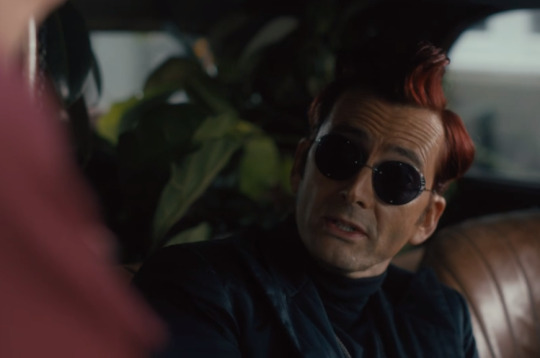
Interesting! Sarcastic? Yes, absolutely; but that’s also a good 4500 years and an averted apocalypse away from “I’m a demon. I lie,” wouldn’t you say? Someone is sounding a whole lot less depressed and aimless and navel-gazey (do snakes have navels?), and a whole lot more like he’s got a project to focus on, since his "what's the point?" ruminations on the park bench in E1.
And of course we all noticed the costume change right away. Hello, black turtleneck. Feeling cute today, thought I’d cover up my graceful long neck? That sounds unlikely. Let’s put a pin in this one.
There’s also an interesting acting choice going on here. Crowley speaks to Shax in a funny, drawling, too-cool-for-you voice that we haven’t heard in a while. Specifically, not since 1967. If you go back and give the S1E3 scene in the Dirty Donkey a listen, you’ll hear it (and if you know of another instance of it that I've missed, please let me know!). In S2E2, he keeps up this odd voice (if anybody knows what kind of affect this is supposed to be, please do tell!) throughout this dialogue with Shax, except for the brief moment when she first surprises him about the joint miracle having been detected.
1967 was a fun year. Crowley masterminded a heist! And seemed like he was having a ball doing it, right up until his little caper was called off after Aziraphale brought him the thermos of holy water. Crowley spoke to his co-conspirators in that same funny, very 60’s-caper-film voice. He wore a hip 60’s turtleneck. He bought petrol for the only time ever, so he could get those sweet James Bond bullet hole decals for his car (per the book, seen on the Bentley in the show).
Those James Bond bullet hole decals would of course have been part of a promotion for this 1967 release, which you just know our film-enjoying demon went to see in the theater:

Starring this suave, be-turtlenecked guy:
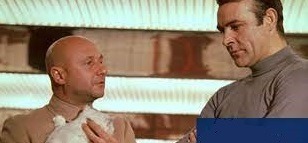
And now - begging your forgiveness - a brief rant.
There are a number of posts out there that refer to Crowley’s S2E2 turtleneck as a flirtatious sartorial choice - actually, ‘slutty’ seems to be the favored accusation. There are even a few posts floating around commenting on how sweet it is that Crowley swaps out his slutty, kinky, throw-me-over-your-desk-and-take-me turtleneck for a more dressy and appropriate collared shirt specifically to attend Aziraphale’s Jane Austen ball.
Now this is all in good fun, and Crowley does indeed look fantastic here, and I do love a good fangirling sesh as much as the next person. However, fandom’s collective tendency to interpret what we are seeing on the screen through the lens of romantic expectation can, at times, give rise to a kind of blinkered enthusiasm that obscures the original text in a haze that is part Mandela Effect, part unrestrained horniness, and part in-group code talking and identity reinforcement.
Respectfully, Crowley’s black turtleneck does not appear at all in S2E5: The Ball. In fact, it never appears again after the end of S2E2.
For Someone’s sake, let’s collectively pull our heads out of the romantic fog/gutter for a moment and focus on what we are actually seeing in the book and on the screen. For Crowley, this is an uncharacteristic within-period costume change. There is a surreptitious flick of the wrist happening here, out in broad daylight, and we are all missing it.
So here’s a thing. Aziraphale appears to have settled comfortably into life on Earth, his neighborhood, his books, using Crowley as an outlet for sharing his good deeds that he would once have reported to Heaven. Meanwhile, at first glance, Crowley appears stuck in a rut. There he slouches on a park bench with Shax in S2E1: a guy who lives in his car, stagnantly clinging to old familiar habits, mulling over the pointlessness of it all.
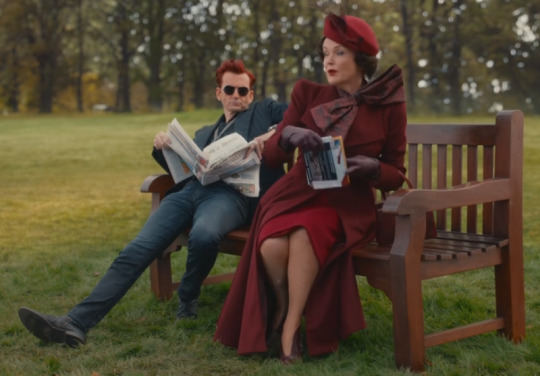
Setting aside the bit about living in the Bentley (I’m going to attribute this to well-documented issues between him and Aziraphale, discussed in many other excellent metas, and move on), Crowley has at least two very good, proactive reasons for maintaining his contact with Hell through Shax. First and foremost, it’s a source of information he can use to keep ahead of potential threats to Aziraphale and himself.
But also, I would posit…he kinda likes it.
Recall that book GO was first conceived as a parody, with Aziraphale and Crowley as spy-against-spy (but not really) field operatives in an ages-old cold war between Heaven and Hell. Their entire book dynamic is rooted in the trope of two opposing agents who have been in the field for so long that they now have more in common with each other than with their respective head offices. Their St. James’s Park meetings among other spies and ministers trading secrets are a sendup of what was once a well-known Cold War-era cliché.
Our contemporary Crowley still likes slick outfits and hellaciously expensive watches and high-performing vintage cars and pens that write underwater while looking like they could break the speed limit. He coaches Shax on how to blend in as a demon on Earth, and he helpfully redirects the wayward contact looking for the Azerbaijani sector chief. He loves improvising and getting away with shenanigans under the institutional radar. And boy golly was he impressed with Jane Austen: master spy, brandy smuggler, and mastermind of the 1810 Clerkenwell Diamond Robbery.
And if you look at it a certain way, for as long as Crowley has considered himself to be on “[his] own side” - going at least as far back as Job - he could almost think of himself as a sort of double agent. It’s actually a very romantic sort of notion, befitting our hopeless romantic of a (professedly former) demon; but it’s romantic in a very different way than we, the audience, have been primed to watch for.
In other words, in a very “on my own side” kind of way, Crowley really gets a kick out of being a spy. Or at least, dressing up and accessorizing as one, and moonlighting as a good-doing double agent when he can get away with it. And also being a plotting criminal mastermind. Two sides of a coin, really. Just look at Jane Austen.
My point is: No, Crowley did not wait around for Shax to come find him in a turtleneck so that he could go flirt with Aziraphale later. He’ll flirt with Aziraphale no matter what. No, this:
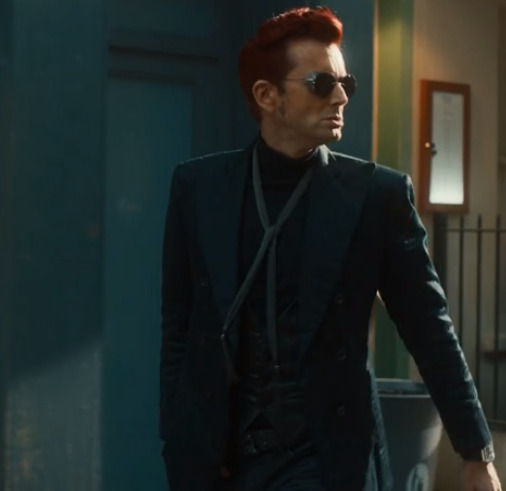
is actually this:
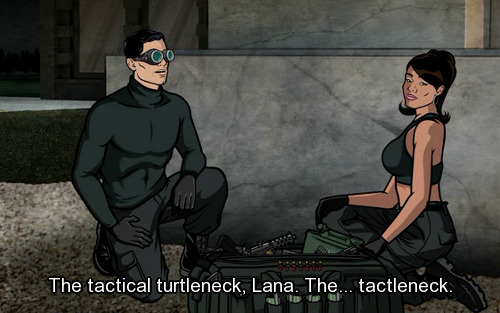
Much like the one he wears to the Dirty Donkey in 1967:
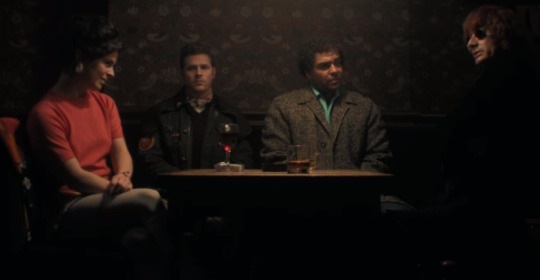
whilst holy water heist-plotting. Here's a clearer shot with gratuitous Bentley, because I love them:
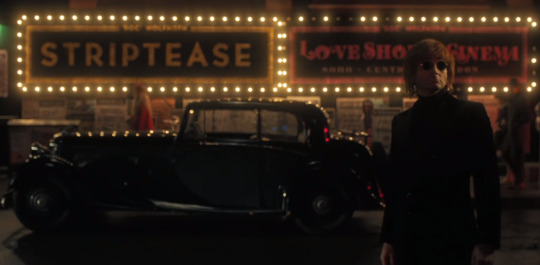
…and which he'll wear again, with appropriate camouflage, while infiltrating Heaven in S2E6:
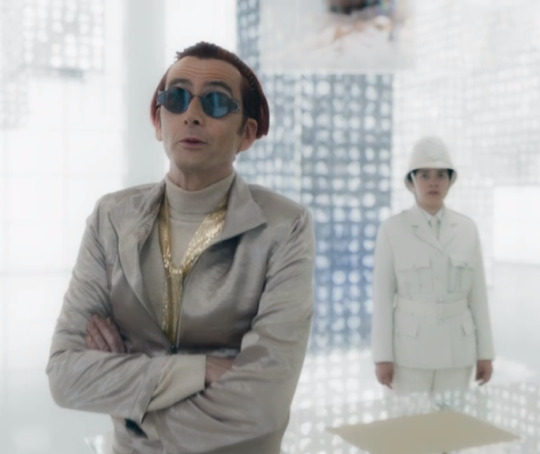
That is the 1967 planning a HEIST turtleneck for committing ESPIONAGE and STEALING THINGS in. Because turtlenecks are what modern human master spies wear to get their hands dirty - after all, he saw it in a movie once.
Crowley dons his tactical turtleneck sometime during the first major break in the action (which doesn't happen until after the joint miracle to hide Gabriel) after he learns about the threat the Book of Life poses to Aziraphale. Loverboy started mentally preparing himself to go after that book immediately upon learning that it was in play as a genuine threat.
Now let’s pick up at the S2E2 Dirty Donkey scene, reading the story from this angle. Of course, Crowley enables Aziraphale’s delusions about Heaven by hiding information from him, and does not disclose the Book of Life threat when they meet again. They go into the pub, Aziraphale shamelessly paws Crowley’s chest like the seductive Bond Girl he is, and Crowley gets to act all smooth and suave and intimidating as he chases off the interloping Mr. Brown (or Mr. Collins for the Pride & Prejudice fans, take your pick).
Ergo, theory: beginning in S2E2, Crowley is already thinking of himself as a Jane Austen/James Bond action hero (“How will our hero cope?”), psyching himself up to rescue Aziraphale by getting his spy game on and stealing the Book of Life.
Now, watch closely...This is where Aziraphale and Crowley brainstorm their plans to solve the problem they both know about: getting Maggie and Nina to fall in love and thereby get Heaven off their backs. Crowley’s vavoom plan is drawn from yet another movie (“Get humans wet and staring into each other’s eyes - vavoom, sorted. I saw it in a Richard Curtis film.”). But Crowley also implicitly shares his solution to the problem he hasn’t told Aziraphale about. And true to form, Crowley’s Jane Austen solution isn’t the same as Aziraphale’s Jane Austen solution.
Two solutions that fail by the end of Season 2, and a secret third one that might still work...and there's our magic trick of three.
‘“I’m lost. Am I doing a rainstorm?” Yes, babe. And a heist, too - just not until season three. Can I get a wahoo!?
I won’t spend time on A Companion to Owls during this meta, except to note that in all three minisodes, we get to watch stories that involve Crowley acting as a double agent on “his/their own side” - successfully making Hell and Heaven think he’s fulfilling their will while saving Job’s goats and children; failing to fool Hell when he does a good deed in Edinburgh; and of course, collaborating with Aziraphale whilst evading detection as an infernal turncoat during the Blitz.
(Because this is getting long, I'll also skip over Crowley's interrogation of Jim in this episode - I'll probably come back to that in another meta. But interrogating is a rather spy-ish thing to do.)
When we catch up with Crowley again later, he’s already slipped out of the bookshop, having left Aziraphale to his biblical reverie about Job. He saunters snakily down Whickber Street as usual, but with a very pointed and swift glance over his shoulder (see pic above). This demon is up to something - possibly something we didn’t get to see, something that may have happened offscreen while he stepped out. In any case, knowing there’ve been unfriendly angels in the neighborhood that morning, he’s rightly concerned about being spied on.
From this point until the beginning of episode six, there isn’t a whole lot of opportunity for Crowley to make any next moves. He babysits the bookshop, during which time he manages to wring some crucial information out of Jim; he follows his Crowley’s Angel around like a puppy, and downs a bottle of red like a good old fashioned lovesick boy once that’s been pointed out to him. If any plotting or scheming is underway, this occult being is keeping stumm for now.
This has been a long one, so I’ll wrap up with Crowley’s infiltration of Heaven with Muriel. The turtleneck disguise works (Archer fans, be vindicated!) long enough to gather some information that will be crucial not just to the denouement of S2, but also to Crowley’s journey in S3 (previous post on Crowley's Fall, Saraqael, and memory wiping). And Aziraphale gets to enjoy that view exactly zero times. The point isn’t oh, a turtleneck! How flirty! So cunty! So cute! Y’all. Everything matters. The costume change was a deliberate choice. In-universe, Crowley’s decision to wear his special spy turtleneck for spying in is a signal that he is out doing spy things, even as we watch.
In sum: Beginning in S2E2 and continuing through the end of the season, Aziraphale and Crowley are actively living out the scripts of two parallel, concurrent, and completely different Jane Austen stories. But you and I, dear fellow audience member, we came here for a comedy with a hefty jigger of romance, and that’s what Neil gave us to focus on. And right up until the Final 15, that was the only story we saw.
Meanwhile, Special Agent A. J. Crowley doesn’t have time to mope around at the end of S2E6. He’s kicked down, but he’s not out. He's got a Book of Life to steal, a very serious bone to pick with a certain memory-wiping angel, and his Angel and the world to save.
“‘Heigh ho,’ said [romantic, optimist, former demon, hero, master spy] Anthony Crowley, and just drove anyway.”
#so honestly#I think the biggest mark against this conclusion is that Crowley sees his mirror Maggie taking a nap at the end of S2E6#there is a strong chance of a depression nap before any further spying gets underway#but I am counting on Muriel to be a dorky ray of sunshine and snap him out of it with Clues#good omens#good omens meta#good omens 2#crowley in a turtleneck#demon bookseller plantdad spy
2K notes
·
View notes
Text
So liiiiike . . . no promises about updating every day of the month again, BUT: Day one of "Kon meets pink kryptonite and decides to fuck Tim and his boyfriend about it" behind the cut. (( chrono || non-chrono ))
“Naw, man, can’t happen if I’ve got you all wrapped up,” he murmurs maybe a little bit more breathlessly, feeling all warm and liquid and heavy, finding a way to settle in a little more heavy, and Bernard muffles a moan into his collarbone. Kon puts a little hitch in the next roll of his hips, just to change up the way their cocks grind together a bit–keep interesting for the guy–and flexes and ripples the TTK grip he’s got around Bernard’s cock and rubs that one little point of pressure in across his taint again, and then splits it up into multiple little points and rubs and taps in across it instead, and back across his hole too. Bernard curses. Loudly. Tim makes an approving little noise.
Kon bites his lip and feels warm all the way through.
Really, really warm.
“Jesus, your cock is so distracting,” Bernard groans, rocking his hips up harder against his, and Kon shudders and presses down as close as he can get. “Ahhhhh god, that does not help, Jesus, I really wanna do something about that gorgeous fucking monster of yours. God, this is what I get for not being a meta or an alien or something, huh, my bad there, my own damn fault.”
“Fuck, you’re so fuckin’ cute,” Kon mumbles maybe a little bit blurrily, nuzzling into the other’s neck and shoulder again and letting his TTK just press in tight around him, just for a second or two. It just feels–Bernard feels good. Making Bernard feel good feels good. “I’d stick it in you if I could, you could do whatever you wanted with it. Promise I’d last longer doing it that way, last as long as you wanted.”
“Christ fucking hell and–” Bernard starts just as Kon strokes up inside him with his TTK, just feeling him out a little, and then throws his head back with a choked gasp instead. “HELL.”
Kon licks his lips; tries to concentrate. Tries to remember all the little ways Bernard had treated him, both when he’d had his fingers and when he’d had his dick in him, and tries to match that pressure and rhythm and just–touch, he guesses. He really doesn’t have to work him open for it, so . . .
Though he can still feel Bernard reflexively trying to clench down around his TTK either way, which is . . . definitely a thing to feel, fuck.
“Tim, you fucking asshole!” Bernard half-sputters and half-chokes, throwing an arm across his eyes and squirming between the mattress and Kon’s TTK and–
“So he can, then?” Tim asks mildly as the camera goes off a few more times.
“OBVIOUSLY, YES,” Bernard yells at him, digging the fingers of one hand in against Kon’s back and fisting the other in on itself, and Kon just–has a thought, real quick and brief, and then reinforces the mattress underneath them to keep it from compressing, and then drags a long, slow stroke of telekinetic pressure up Bernard’s body to pin him flat against it. It doesn’t give at all, and obviously neither does his body, and Bernard makes a strangled groan of a noise and smacks his fist against the bed over his head. It doesn’t give there either, and Kon just–grabs Bernard’s wrist, and pins his arm down and weighs him down, and Bernard’s next strangled noise cracks into a keen.
“Oh,” Tim says, sounding a little impressed. “Good idea, pet. You’re always so creative.”
Kon feels way past warm right now.
#timberkon#konbern#timkon#timbern#kon el#conner kent#bernard dowd#tim drake#superboy#dc robin#wip: think pink#dom/sub
134 notes
·
View notes
Text
@5hrignold agreed!

does anyone think about the fact that rick never actually said "no" when morty asked him if he was bait for rick prime?
i doubt hes bait now but instead of just saying "no morty. youre not." he evades a clear response and instead specifically says "for you to be bait, it would mean he cares about something. he truly does not give a shit"
this is...interesting. theres sort of an implication there that rick KNOWS for sure rick prime doesnt care about anyone or anything. including his original family
i feel like, originally prime smith family WAS bait. or maybe as close to bait as they could be. rick has done some really terrible things with no remorse and when he finally joined the prime smiths, he was at his lowest point. i think rick reached a point where he was fully willing to kill this family to get back at prime
but prime didnt care. prime would never care. "he's the real deal."
so rick just...stayed there. and yea, morty is not bait NOW, so he technically didn't lie to the kid
#rick and morty#rnm#rick sanchez#rick prime#morty smith#he avoided the question in a similar way to the end of close rick counters of the rick kind#which makes a lot of sense considering how he didn’t want to admit to morty that he cared about him/that he did good#and i can’t help but think that he was scared to see that defiance and leadership in morty the way he saw it in prime?#especially with him saying ‘i’ve seen what happens when a morty gets too cocky’ and refusing to tell morty what he means#(‘i’ll tell you when you’re older)#which is not only a classic example of rick avoiding giving an answer#but also very interesting considering the more recent meta references about the lack of ageing/morty being 14 forever#and dan harmon himself saying the show could end with morty turning 15#it would be interesting if the show itself was a universe rick had created#and for him to heal he had to destroy it (end the show)#it would be very cool on a meta level especially the way rnm handles that stuff#almost akin to like our universe being another ‘microverse’ or simulation#or even something like the roy game#where time is running much faster inside than out#so it’s almost like the show is our view into that dimension#and he’s still outside trying to decide what to do in real life#especially considering that the next two episodes after solaricks both feature this concept?#i think would it be a cool way of having an ending that was deliberately ambiguous#(eg bojack horseman ending without you really knowing if bojack will improve or not)#i can imagine rick realising in the ‘simulation’ (the show) that what he needs to do#or if the other ricks put him in a simulation (a la simple rick) as some sort of punishment? or maybe trying to see if his story checked ou#especially the way in his crybaby backstory the building of the citadel is largely glossed over#and just goes straight to him crashing into the prime dimension#it makes you wonder how much of what we’re seeing really happened)#and especially since solaricks makes a clear point about rick ‘forgetting about ageing’ in his timeloop in c137
222 notes
·
View notes
Note
Hi, I just wanted to tell you that I absolutely love your metas! You’re not only clearly a very talented writer but also blessed with such great insight into these characters that my dopamine levels always jump to absolute heights with every new post. Thank you so much for sharing your thoughts and being a real gem in this fandom ❤️
Also, because I couldn’t find any post (or did I miss it?) about specifically Harry/Snape (without a third person added to the mix) I would love to read your thoughts on it. Either romantically or gen, after the war, where Snape lives. Thank you so much for indulging me :)
thank you very much for the [exceptionally lovely] ask, anon!
snarry is definitely a popular request...




... so let's get into it!
[and let's also get out of the way that i do not back snamione as a pairing. you can find out why here.]
while they're by no means my otp - and while i'll admit to preferring both snape and harry paired up with lord voldemort - i have long dabbled in a bit of snarry, particularly because it's a ship which attracts astonishingly talented writers. and - in particular - astonishingly talented writers who think really subtly, intelligently, and creatively about life and love and all the questions therein. i'm always really struck by the nuance with which both snape and harry are treated in so many snarry fics, and i much prefer that to the more one-note treatment each character gets elsewhere in the fandom.
and - of course - why snarry works so well as a ship is because it has such a solid justification in both harry and snape's canon characterisation - and because this compatibility is made all the more interesting by the layer of conflict caused by snape and harry's mutually antagonistic relationship. harry adores the half-blood prince - looks up to him so much, in fact, that he genuinely wonders if the man was his father - because they're intellectually compatible, have similar senses of humour, have similarly self-serving aspects to their moral codes, and have a shared reactivity and emotional volatility. the text emphasises this frequently, most explicitly when hermione tells harry in half-blood prince that he doth protest too much:
"He tried to jinx me, in case you didn’t notice!" fumed Harry. "I had enough of that during those Occlumency lessons! Why doesn’t he use another guinea pig for a change? What’s Dumbledore playing at, anyway, letting him teach Defence? Did you hear him talking about the Dark Arts? He loves them! All that unfixed, indestructible stuff - " "Well," said Hermione, "I thought he sounded a bit like you."
harry is also willing to acknowledge these similarities himself, sometimes. he empathises with - and even, occasionally, respects - snape well before the conclusion of deathly hallows, and - crucially - does this on his own terms. him refusing to dismiss his disgust at his father's treatment of snape in snape's worst memory in order not to make sirius or lupin feel awkward is incredibly impressive - and is something i don't think he gets enough credit for.
and since one of the things which makes me a member of both tomarrymort and snapemort nation is harry's instinctive understanding of how voldemort's childhood affected him and voldemort's understanding of how snape's childhood affected him, this is something i think provides a fascinating seam for authors to mine when writing about snape and harry together.
similarly, post-war, i think snarry is one of the best pairings for exploring how both harry and snape come to terms with the realisation that - no matter how well it all worked out in the end - they were both pawns in a larger game. i think that snape is, really, the only person in harry's life who could ever come close to appreciating what it means to have dumbledore send you out to [nearly] die - and i also think, because the man is always at the forefront of my mind, that snape is one of the few people in harry's life who can appreciate the fact that harry, as much as he also hated and feared him, was impressed by, sympathised with, and wanted to help voldemort.
snarry is also an incredibly compelling ship for thinking about power, and how both harry and snape understand it. i wouldn't care about the age difference, or the fact that snape and harry's acquaintance is established while harry is a child and snape is his teacher, even if the dynamic between them could only ever be heavily unbalanced in snape's favour, because these are fictional people. but i'm often struck by how interestingly snarry writers deal with snape being someone who views himself, inherently, as a supplicant - and who therefore ends up offering harry the upper hand in their dynamic [whether this is platonic or otherwise] despite the fact that he is the younger partner. snape's capacity for destructive devotion and self-subordination is one of his most fascinating canon characteristics - and snarry is one of the best vehicles for exploring this.
indeed, the canonical snape clearly regards harry as someone who possesses power over him. his complaints about harry being rich, spoiled, and arrogant make clear that he considers harry to be the second coming of the dynamic he had with james [with it never seeming to occur to him that this is an absurd thing for an adult teacher to think about their pupil], while his complaints about harry's fame are because he views harry as an inherent insider [someone with a pureblood surname and the money to prove it] to the wizarding world while he himself is an outcast. this can cause some exquisite toxicity - especially when snape, who tends to view every interaction he has though a win-lose lens and who becomes incredibly nasty in both victory and defeat, is proven right, having insisted to harry that the wizarding world won't like its golden hero getting railed by a tenuously-acquitted death eater.
but it can also result in something surprisingly beautiful. harry likes to save people, after all, and snape would - deep down - very much to be saved.
and one way he can do this is by offering snape the forgiveness for his role in lily's death which it's clear the canonical snape refuses to accept he might be entitled to. and, in doing this, the pairing draws out a theme which i am obsessed with - that there is a lost generation, whose ghosts haunt the characters alive in the canon timeline. no matter how negative his opinion on james and sirius and so on is, by virtue of knowing them, snape provides harry with a connection to a world he would be a stranger to otherwise, while harry provides snape with a mooring in the present which makes dealing with the weight of the past - and processing the fact that he's virtually the only person he knew as a teenager who's still alive - easier.
i also think that fucking your enemy's nephew is iconic, and snape and petunia meeting again in a scenario in which he's harry's boyfriend is a concept that sustains me.
153 notes
·
View notes
Note
ok so i'm rereading Order of the Phoenix and what's up with Draco being so... helpful??
Like back in the Goblet of Fire he's litterally telling the golden trio to hide Hermione because she's visibly (how could you tell tho?) a muggleborn;
then in OotP in the train to Hogwarts he comes to say hi to Harry and hints that Sirius had been spotted by Lucius (the dogging line);
THEN he goes all the way to lean on Harry during Care of magical creatures to say how Hagrid's being messing with stuff to big for him.
HUH??
Why on earth would you say that to Harry? To taunt him? But he could have done it without revealing precious intelligence passed by his father!!
Like, to me it makes sense if it is intended as Drarry moments, because he has a crush and can't help but being invested in Harry's life, and accidentally being helpful to Harry, but we know that it wasn't the terf meant.
And we clearly see how easily Draco can make Potter angry(their interaction during Potions and Quidditch, Potter stinks badges, Weasley is our king ecc.)
It seems like he's trying to help in a reeeeaally backward way, but at the same time he's enjoying himself so much that they do not translate as helping hand.
Also to me it kinda falls flat on a Doylist perspective because the golden trio would have hidden in the forest without him, and they were already worring about Sirius and Hagrid so...
What do you think about it??
P.s.: i reaaally love your metas about hp universe, can't get enough of it <3
yeah, it’s wild. I get why while the books were still being written some people thought he was secretly undercover trying to help the order or something.
I don’t think at that point he was consciously trying to betray his side yet. I think that didn’t happen till book 7. But at the same time, I do think two things were going on.
First of all, he always craves Harry’s attention and does everything you can to get it. And he also really wants to be a part of her story. Harry has other things going on his life and till book 6, Draco isn’t the center of his focus (although he does actually think about and watch him a lot - something Draco doesn’t realize but would be thrilled if he knew). From the moment that Harry rejects his friendship Draco looks for ways to insert himself back into Harry’s life. Dangling his knowledge of things Harry is interested in is one way of doing that. And it also puts him on Harry’s level - in his mind - because his secondary involvement with the Death Eaters mirrors Harry’s secondary involvement with the Order.
And also in his mind shows how cool and serious and important Draco is. He’s always creating the perfect set up for an enemies to lovers story but Harry won’t buy it. Like I think of his mind he think Harry’s going to be like OK I really wanna know what’s going on so I’ll make a deal with you and that will evolve into a grudging friendship. Of course Harry won’t do that while Draco holds the attitudes he holds. Nor as I’m sure he also hopes is Harry going to be like wow I realize you’re so important and special and well-connected and I was wrong to turn down a friendship with you. Draco desperately wants Harry to need and respect him. (Only when he grows beyond this post book 7, and learn to except Harry’s boundaries and to change his own behavior will he actually earn either of those things.)
Secondly though, I think it’s really notable that most of these instances end up helping Harry to either learn information about someone he cares about or protect someone he cares about. The example at the World Cup is really striking. Hermione is specifically in danger because Lucius is one of the Death Eaters under the hoods and he knows who she is and likely intends to target her. Obviously, Draco isn’t going to directly betray his father, but he does warn her that if she stays where she is, she will be recognized and attacked.
Draco at that point kind of likes the idea of violence but he doesn’t like the reality of it and I think a part of him is uncomfortable with what would happen if she actually got caught so although he doesn’t acknowledge it even to himself, that’s the basis of the words. Plus he knows was Harry will fight to the death to protect her. Something similar is probably also a factor in what he says about Sirius. Even his comments about Hagrid to at least revealed that he is alive In addition to dangling more knowledge if Harry will talk to him and pay attention to him - which he won’t.
#drarry#Harry Potter#Draco Malfoy#asks#Hpdm#dmhp#harco#Also I forgot to say but thank you so much for your kind words#I am beyond delighted that ppl like my metas
91 notes
·
View notes
Note
Loving your Gold to Mold story so far it's a very interesting take on the yandere bat-family I haven't seen yet, with you actually being able to fight back and not giving them the chance at all, though to be fair I'm still pretty new to the trope
I gotta ask though, since the beginning I've noticed a distinct lack of a certain Meta family member, and I'm wondering if it was an intentional decision to leave him out, was he left out cus he seems like the only family member who wouldn't just go out of their way to ignore you (besides Alfred) and actually become a friend or perhaps a real sibling to you, or was he not put in because then it would give the batfam a reason to trust Metas and therefore think about trusting the Megamycete, or perhaps a secret third reason
With how the timeline's playing out, I guenuinely doubt we're ever gonna see him, with Joker dead the incident with his parents never happen, and now that that papers out you know they're never gonna be within 50 feet of a Wayne, let alone let their son dress up like a Bat with him
I can just imagine Duke stting by while everything burns around him, reading the article, sipping his tea, going "Man I'm glad I got nothing to do with that
Full disclosure: I left Duke out because I don’t know him well enough to write him. When I first got into Yandere Batfamily, all the posts I read only had Bruce, Dick, Jason, Tim, and Damian with a few of them including Steph, Cass, and Barbara. I have a few I’m reading that have Duke, but I just don’t know him well enough to have him in this series.
But, if I had to guess, I’d say he would be like the rest of the family: ignoring you because you’re insignificant (he’d never say that, but that’s the truth) and he’d go off the deep end when he realized he had forgotten you for years.
But, he would feel a deeper connection to you (at least in his mind) because you both have powers in a family of vigilantes that routinely prohibit metas from entering their city. You two are so similar that you might as well be brothers (he’d never tell Damian that for fear of getting a good look at his sword) and he wants you to come home so you two can compare your powers and stay up late playing video games.
Maybe he could convince Bruce to let you become a vigilante and patrol during the day with him— ok, Bruce said no.
But if i had to come up with something for Duke in this series, he’s living with his parents (and he’s also an avid fan of your game), who are free from Joker’s gas due to you killing him years ago.
And yes, he’s eating up the drama with a spoon, wondering how he could’ve ever admired a family who treats someone like you so badly.
66 notes
·
View notes
Text
Initial Agatha All Along Ep 5 Meta Thoughts
Holy FUCK. This episode did not go where I expected it to. Spoiler-y thoughts and theories below:
The Lies We Tell Ourselves
Now I know so many folks are gonna be arguing how awful or evil or deplorable Agatha is for killing Alice. Did she do it on purpose? Or was she not aware or have control as she claims?
On a rewatch (ow my heart) and I guess in Billy’s defense it does seem textually ambiguous. Enough time passes and Agatha seems aware enough of what was happening that you see her lean into the power siphoning — euphoria evident on her face.
And on rewatch, it’s also ambiguous if she had the ability to snap out of it when her son was mentioned or whether it stopped because Alice was fully drained in that moment.
Agatha being possessed means she didn’t initiate this exchange — but something happened in the moment. Was Agatha operating on pure instinct? Like an addict trying to come clean but just had their drug shot into their system? Did she even see Alice or just the power going into her? Did the hunger and euphoria just override her thoughts?
We simply don’t know enough about how Agatha’s ability works. What we do see is Agatha looking distraught after she snaps out of it. She looks taken aback by what she’s done.
Now we know Agatha lies. She lies even to herself sometimes. Agatha lies to survive, for power and to protect herself. She puts on a show when she’s afraid, as Rio points out (more on that in a bit).
Why I think Agatha did not want to kill Alice comes from the scene after, where you see Agatha alone. She’s shaken. She’s not happy about what she’s done and here there’s no audience to put on a mask for.
She definitely reads as sincere trying to defend herself to Billy, although there is the possibility that she is genuinely lying to herself as well, in that she could have chosen on some level to give in to that incredible rush of power, everything else — including herself — be damned. Definitely not the first time we’ve seen the “magic as a drug” analogy.
My Shipper Heart
Okay so we got some delicious food this ep. Agatha and Rio giving each other their brooms all too easily, despite the awkward looks. Agatha flying free and looking at Rio like she’s her North Star, like she’s the one she wants to share this with.
And yes while Rio may seem eager to slit Agatha’s throat (who knows how their no-killing rule works!), she’s also the one who truly understands Agatha at this point.
I’ve mentioned this before but Rio’s arguably the most truthful one of this group. She’s mercurial but she’s honest about who she is and what she wants. And she’s been with Agatha enough to shed light on her truth.
Rio’s the one pointing out whose trial this is, who sees Agatha doing dumb shit as her hiding her very real fear.
And notably we see Rio toss aside her casual detachment and raise her voice for the first time on the show. No. No way!
Power, Grief and Darkness
Look, Billy is going to be a Young Avenger or something so we know he’s gonna go on an arc for the remaining eps but what a juicy one it’ll be, because at least Agatha will be there with him. I’ve suspected he placed the sigil on himself for a while now but I have no idea how aware he is of everything that’s happening.
What’s interesting is how Agatha puts the villainous mask on right after Billy claims to be morally superior. Agatha’s bullshit detector pinged and she digs into that indignation, that anger for strength. Agatha doesn’t like being on the backfoot, certainly not when it comes to feelings like regret.
I see Billy as needing to confront and understand his own darkness, and in doing so understand Agatha’s darkness. Things aren’t so black and white when you’re in pain, and angry at the world, and have the power to lash out.
Agatha is set up to be a mentor to Billy here in a way she couldn’t for Wanda, although the potential was clearly there.
It’s definitely going to be an interesting Road with them going forward, given how dark this ep got.
#agatha all along#agatha all along spoilers#tv: agatha all along#SO many feelings and thoughts#hey Schaeffer I have questions#first of all HOW DARE YOU#AAA meta
89 notes
·
View notes
Text
Fibers in Fiction - A Silmarillion Writer’s Guide to Þerindë's Craft
It's the @silmarillionwritersguild's Meta Week, and I wanted to contribute my two special interests -- fiber art and Tolkien -- and my real world degree in Medieval European Women's History. So here's a essay with writing resources for Day 6 - apply real-world disciplines to Middle-earth.
Most of this I had sitting in the back of my head and do not have quality, academic sources for. Links are either to written or video resources, or to picture credits.
Intro
What is fiber art? My personal definition is the manipulation of some sort of fiber into something functional and/or beautiful. There are a few characters in Tolkien’s works that are associated with a fiber craft of some sort – Vairë the Weaver, Míriel Þerindë, and Arwen Undómiel come to mind the easiest. I've seen various fanworks that have Caranthir also be a needle-worker, but that's not canon the way these three women are. There's a lot to be said about the intersection between "women's work" and needlework and feminism, and Tolkien's inclusion of those patriarchal standards, but ... that's not this essay.
There’s a lot of methods and a lot of disciplines that can be put under the umbrella of fiber art. The purpose of this essay is to help fic writers expound on the process of a fiber craft using the correct terminology, gain an understanding of period(ish) appropriate tools/techniques, and the differences between some of the major forms of fiber arts.
What is a fiber?
Starting with the basics. A fiber is a material that is longer than it is wide and typically used in textiles or electronics. This is Tolkien’s world, we’re not worrying about electronics, so let’s turn to textile fibers. There are four main types of textile fibers:
natural fibers - flax, hemp, cotton, jute
animal fibers - silk, wool, catgut (not made from cats), angora rabbit fur, goat hair (mohair, cashmere)
synthetic fibers. - polyester, acrylic, nylon, rayon
Metallic fibers - gold, silver, copper, mithril that have been formed into a very thin wire
Obviously, unless the Valar let Fëanor get into oil extraction, all those synthetic fibers are right out. Leatherwork does not count as a fiber art, since true leather is a processed animal skin. Cords can be cut from leather to act like string, but that’s not a true fiber. And don’t talk to me about pleather or vegan leather. That’s just plastic and it’s bad for the environment.
Spin a Thread, Draw a Wire
For the three types of fiber that could be used in Arda, there are two methods to turn these materials into thread: drawing and spinning.
Drawing a wire: a small piece of metal is pulled through a device called a draw plate. A draw plate may have many holes through which the wire is pulled, each getting successively smaller and smaller until you reach the gauge (size) you desire. As you pull the wire through each smaller hole, the wire gets thinner and longer. Rinse and repeat until you have a wire of the desired thickness. If you’re combining a wire with some sort of flexible fiber (couching, weaving, etc, see below) it needs to be extremely thin in order to be flexible enough to bend with the fiber it’s attached to.
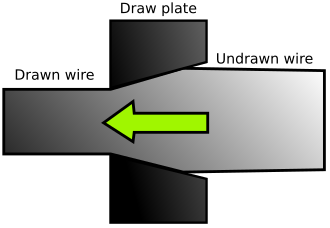
You need a lubricant to ensure the wire doesn’t get stuck in the draw plate. Covering the wire in oil is a good way to go (this is called dry drawing. Wet drawing is when the draw plate and the wire are both submerged in oil as you work). Application of heat can make this process easier, but depending on the metal, you might not need very much.
Gold, silver, and copper are all very soft metals in their purest form -- alloys will make them stronger, less malleable, and harder to draw. Mithril, given that it’s a fictional metal, I can’t confidently comment on, but it’s said to have been very malleable, so I would imagine that the same process for creating very thin wires would also work in the same way as it would for the other metals listed.
A spun thread is an assortment of individual fibers that have been twisted together to make a stronger unit. Natural, animal, and synthetic fibers can all be spun.
Usually when we describe something as a thread, we’re talking about a spun fiber that is fine/thin and smooth enough for sewing or weaving applications. Spinning a thread involves taking a pile of washed and combed but loose fibers (a bundle of these is called a roving) and literally twisting it until it forms a thread. This can be done with a drop spindle or a spinning wheel. A drop spindle is the more mobile form of spinning, and simple enough that medieval families would often have children spin. With practice you could even do it while walking. Imagine, for a moment, Míriel Þerindë walking through Beleriand during the Great Journey, drop spindle in hand, making the thread she is known for. That’s some good stuff. I’m begging somebody to write this.
Here’s some video tutorials on how to use a drop spindle and how to use a spinning wheel. I can’t explain it succinctly, and a visual is always a good tool.
Plyed Threads Make a Yarn
Yarn is several threads counter-twisted around each other. Counter twisting is what holds the yarn’s structure. If the individual thread is twisted clockwise, the yarn must twist all those clockwise threads counterclockwise. The tension holds the shape of the yarn.

Yarns (usually made from an animal fiber like wool, goat, or angora) and twines (usually made from natural fibers like hemp or jute or cotton) are made the same way because they make the threads stronger and more durable than they would be as individual threads, but their material usually dictates how they’re used. Yarns are softer, better for knitting or crochet or weaving. Twines and cords tend to be rougher, better for securing things to other things, for outdoor use, or … you know. The things they do in Angband.
Weaving a fabric
So you’ve got your thread and/or yarn. Now what? Well, you can dye it now (see next section), you can start knitting a garment (you need good socks on the Helcaraxë), or you can start weaving a fabric. Fabric has two components, both made by individual threads in sequence. The warp is generally static, and the vertical thread in most diagrams, including the ones I’m including here. The weft is the thread that passes back and forth horizontally. You can have the weft go over/under/over/under like this diagram (this is called a plain weave) or you can have the weft skip over a number of warp threads to create a pattern or a texture (satin or twill or denim weaves skip warp threads). The pattern depends on which warp threads get lifted or lowered with each pass of the weft, which is typically attached to a shuttle that glides through the shed.

Weaving requires a loom, but that loom can come in various form-factors. A backstrap loom maintains tension in the warp by the position of the weaver, who has a strap attached to the loom going around her back while she manipulates the weft in front of her. This was, and still is, commonly used in native South American communities.

Early medieval Europe typically used a warp-weighted loom, where the warp threads were tied to a loom weight that dangled off the back of the loom frame. This was replaced later with the horizontal loom, which included the invention of heddles (loops that lifted warp threads in sequence to make a shed (opening) so as to make a pattern) and treadles (foot pedals that control the heddles).
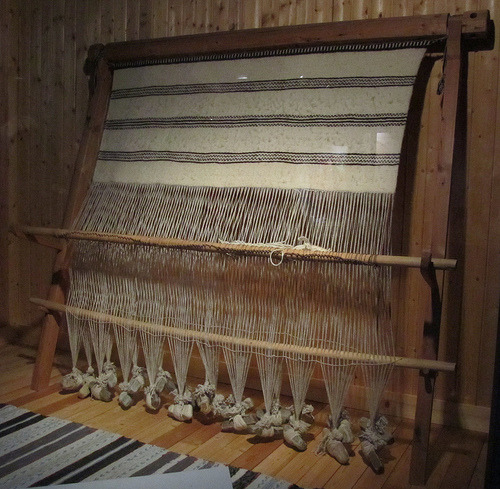
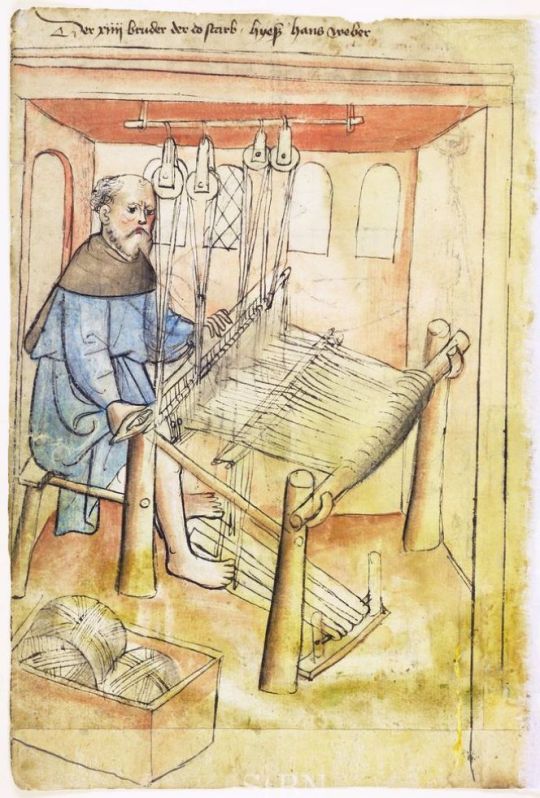
Later, the horizontal loom gets mechanized, and somehow we got computer programs out of Jacquard looms. Fascinating, but not relevant here.
One of my favorite types of weaving is tablet weaving, which instead of heddles or treadles to form the shed, uses square cards. Four threads go through the corners of the cards to form alternating sheds that can form complex patterns. Tablet weaving is great for decorative trim and edges. You can use a backstrap method, a warp weighted method, or an inkle loom to create tablet woven articles. This video is a gorgeous introduction, but a bit long.
What about Vairë’s tapestries, I hear you cry out into the Void? See below :)
Add a splash of color, become ungovernable
Color! The world can create rainbows, and we’ve been trying to make thread to match for ages. Luckily you can make most colors with natural dyes. Purple is the hardest color to get with a natural dye, along with blacks; yellows and reds and browns are easiest.
You have to prepare your dye (usually taking some natural material (onion, cochineal insects, gallnuts, walnuts, marigold flowers, woad, madder, whatever you have) and your thread/yarn/fabric separately before combining them with heat.
Prepping your dye depends on the material you’re using. Sometimes it’s just an overnight soak in a pot, sometimes it’s crushing beetle carcasses into a fine powder, sometimes it’s boiling. I leave it to you, friend, to research the exact color you’re looking to make with a natural dye and how to get that, but this chart might be a good start.

Most thread/yarn/fabric needs a mordant. Mordant is a dye fixative. After all that work making the fabric, you don’t want that gorgeous Fëanorian red (madder root) to come out in the wash water, right? Mordants are acids that can be found naturally, either by processing some plant materials to create tannic acid (oak trees and oak galls) or oxalic acid (wood sorrels), or by working a chemical process using alum, chrome alum, or sodium chloride, or ammonia (stale urine was commonly used before modern chemical processes). Mordants stink to Angband and back, so historically dyers would be outside town or in their own district as to not offend everyone elses noses.
You can get a richer, more saturated color by overdyeing – dying twice or even three times. Dyes are hard to color match; each batch is going to have its own variables (weather, temperature, concentration of the dye, concentration of the mordant, quality of the fiber, etc).
I’ve found this website that goes into a lot more detail. I’m not affiliated with them, but it’s a good starting point.
Tools
A non-exhaustive list of standard tools a fiber artist may use and material it could be/typically is made of:
Thread, yarn, or fabric (described above)
Scissors/shears (metal)
Sharp sewing needle in various sizes (bone or metal)
Blunt needle in various sizes (sometimes called a tapestry needle, bone or metal)
Spindle (wood)
Loom in various sizes (wood, wire, thread)
Shuttle (wood)
Knitting needles (bone, wood, or metal)
Nalbinding needle (bone, metal) (nalbinding is a cousin of knitting and crochet, good for hats and socks)
Crochet hook (bone, metal, wood)
Bobbin (wood, bone)
Lace pins (metal)
Lace pillow (fabric)
Embroidery hoop (wood)
Embroidery frame (scroll frame, slate frame, wood)
Embroidery stand (wood, metal)
Thimble (leather, metal)
Fiber Crafts seen in the Legendarium
Tapestry Weaving
Tapestry weaving is different than standard weaving, because the weft does not go across the entire length of the working area in a shuttle. Tapestry weaving typically uses many, many bobbins or needles of colored thread worked in a plain weave in small areas to make an image. In medieval Europe, tapestries would be used as a form of insulation, to keep the cold out, and as a status symbol. (All I’m saying is, give Himring more tapestries, and maybe the Ever-Cold fortress would be a bit more homey). Here’s this article from the Metropolitan Museum of Art about tapestries, and here’s a video about the making of large scale tapestries, which is the technique I imagine Vairë and Míriel use for the Halls.

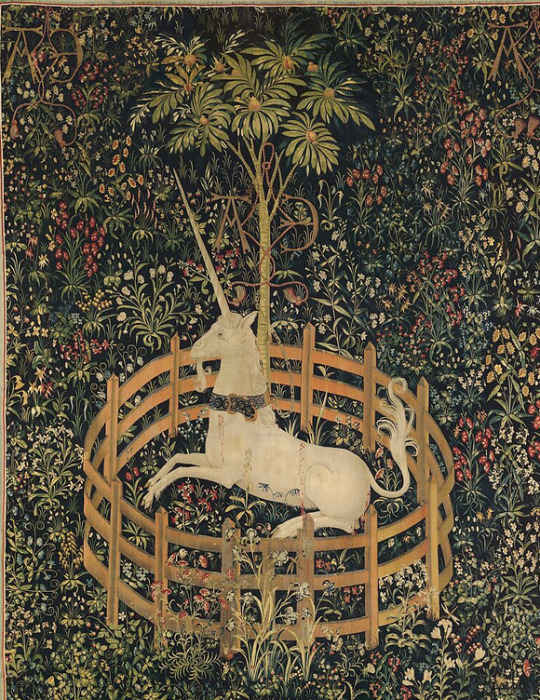
Embroidery
Embroidery is the practice of taking individual colored threads (usually cotton, wool, or silk) and sewing them into a ground fabric to decorate that fabric with a design of some sort. There’s SO MANY ways to embroider things. Cross stitch, which is what your author started out doing, uses stitched squares on a grid to effectively make pixel art with thread. You can do blackwork (which doesn’t necessarily need a black thread) which makes a repeating pattern on a grid but doesn’t make squares. Or there’s more freeform embroidery which lots of people use for natural scenes (flowers especially) but can be used for portraits, landscapes, silly sayings – the world is your oyster. The Royal School of Needlework in the UK has a Stitch Bank which documents how to accomplish many, many, many kinds of stitches.
I’m going to highlight a few stitches that absolutely should be in your writing toolkit if you are working with a character doing embroidery. I’m not going to describe every stitch, but knowing what a stitch is called is half the battle. Okay, maybe a quarter of it, you still have to either do it, or write a good description of doing it, which may be the other 3/4ths of the battle.
Satin Stitch - a good, all purpose filler. Made by stitching parallel lines of thread. Uses a lot of thread, since you should be bringing your needle up through the ground on the same side of the thing you’re trying to fill every time.
Couching - another good, all purpose filler. Made by laying thread or wire flat on the ground fabric, then taking another thread (close in color or not, depends on the vibe) and stitching it down in place securely. This is the main filling stitch in the Bayeux Tapestry (not a true tapestry, it’s just a really big embroidery) and undoubtedly how Arwen made part of Aragorn’s banner with mithril wire.
Straight stitch - makes a dashed line
Back stitch - makes a solid straight line
Stem stitch - makes a solid straight line that can easily curve
Chain stitch - good filler, makes interlocking loops
Daisy stitch - a chain stitch that doesn’t interlock the loops, but stitches down the loop so it doesn’t move. Makes good simple flowers
French knots - tiny filler, lots of good texture. Tiny knots made by wrapping the thread around your needle.
Stump work - 3D effects for ages. Want flowers or leaves to literally jump off the ground fabric? Stump work is your friend, and my personal nemesis.
Conclusion
Knowing the terminology of a craft is integral to learning more about it, and writing it accurately. My hope with this resource is that you might have learned a new term or two, or gotten a few new resources to use in your writing. Even better if this is something you don’t know a lot about, or have never given much thought to, then I hope you’ve learned something valuable here.
53 notes
·
View notes
Text
Hey, y’all!
I’m putting my mod hat on for just a second because I want to make sure you’re aware of @comment-exchange and the good work they’ve done in fandom writ large over the last five years.
Comment Exchange is what it sounds like—a pan-fandom hub for the creators of fanworks of all stripes to share works with low or no interactions and comments. If your work has less than ten comments (or less than fifteen, in the case of multichaps) it’s eligible. Once a work enters the Comment Exchange masterlist, it stays there forever.
Along with traditional fanfiction, Comment Exchange accepts all sorts of different forms of fanwork, including podcasts, podfic, fan comics, fanart, meta, and poetry. All genres and ratings of work are accepted.
To submit, read the rules here, comment on a work on the masterlist (or another low-interaction work) and fill out one of the provided forms. It’s easy and takes no time at all!
There are a lot of interesting and unique fanworks in the masterlist, including works from small book fandoms that don’t get a lot of attention. Even if you’re not interested in submitting to the Comment Exchange today, check out their bookmarks on AO3 to find something weird and wonderful you might not otherwise get the chance to see.
Thank you for everything you do, @comment-exchange! You’re a real one.
100 notes
·
View notes
Text
Obsessed with this scene and will be forever; A very long meta.
Your ‘exactly’ and my ‘exactly’ are different ‘exactly’s’
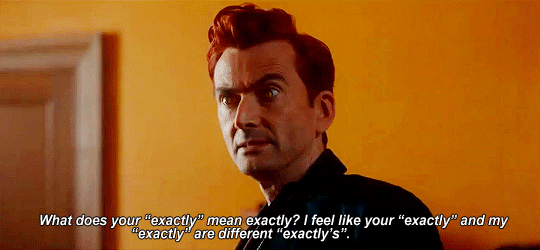
The Scene.
Crowley’s exactly means “We need to be safe and together and away from danger. Let me keep you safe.”
Aziraphale’s exactly means “We need to help because it’s the right thing to do, and we fix things when we’re together.”
Note though, that this is the only time they clarify with each other, and they don’t actually say what they mean, they say what they want to do.
“Let’s drop him off and leave him.” Vs. “Let’s take him in and help him.”
The dissection of this also poses the question, Why does Aziraphale think helping Gabriel is the right thing to do?
And the answer is; Crowley gives him the courage to do what Aziraphale thinks is the right thing and not what heaven decrees is good.
And we can come to this conclusion because Aziraphale for the first time ever, immediately and without hesitation, goes against heaven’s will, without having to be convinced or going through a cycle of indecision or guilt. This is… A. Big. Deal.
Season One.
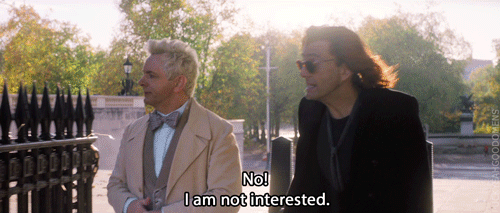
Heaven’s good requires Armageddon to be complete, and under-way. And what does Aziraphale first say about it? “It’s all going to be rather lovely.” “I am not interested[in stopping Armageddon with you].”
Aziraphale loves the earth in this scene. He loves the people on it. He loves all the creatures great and small. He loves Crowley, too. And he still refuses. He needs Crowley to convince him, and even then he still thinks heaven will see sense once he fixes everything. He still believes that right, and good, and holy are the same thing. Even if sometimes he doesn’t agree with it.
Now, let’s go through some history. Between the two of them, for sure, but mainly Aziraphale’s.
An act of defiance; The giving away of a flaming sword. The guilt and worry Aziraphale feels after giving Adam and Eve a chance at survival is not something he gets over quickly. He worries that it was the wrong thing even though it felt right. And the problem isn’t the system that would make doing a good deed the wrong thing, the problem is him. The problem is Aziraphale.
Compliance; The flood. The crucifixion. “God’s a bit tetchy” he says before Mesopotamia is decimated. Aziraphale is clearly uncomfortable with the will of heaven here, but he does not disobey. He does what he is told because the will of God is good and right and correct. He does this same thing with the same reasoning during the Crucifixion of Jesus in 33 AD. Crowley gives us context with a few lines, “Your lot put him up there.” “I showed him all the Kingdoms of the world.” We see a demon who still doesn’t understand why good is so cruel, and knowledge is so evil. And we see an angel that refuses to be conflicted despite his own inherent morality. Because Aziraphale understands why Crowley has questions, he has them too by now. However, Aziraphale has something Crowley didn’t; he has the knowledge of what good intentions and well-meaning questions get an angel.
Doing bad in order to do good. Let’s talk about the Job mini-sode, because let’s be completely real; I’ll never be done talking about the Job mini-sode.

Aziraphale starts this episode thwarting evil. Something he is not conflicted about. You have to thwart evil when you’re good. That’s the whole dance at this point. Crowley stops the dance though, he presents a permit. A permit from a higher authority. Meaning that Crowley, the demon, is performing the will of not only Hell, but also of Heaven. A theme that IS THE WHOLE POINT OF SEASON 1. For all their want of a war, heaven and hell want the exact same thing.
Crowley even states, “The real ‘Big One’ will be between ‘all of them’ and ‘all of us’”. At the end of Season 1 Episode 6.
Aziraphale is horrified by this “permit”. And he goes to check on the validity in heaven, and well. He finds out that it’s real. He doesn’t go higher after that, because he knows you don’t question. He knows he can’t ask why? So he goes to Crowley. If Crowley doesn’t do the evil thing, then Aziraphale doesn’t have to break the rules to thwart it. And well, even though Crowley is a demon, Aziraphale doesn’t actually see him do demonic things all that much. Aziraphale still thinks that Crowley acts like an angel. He’s even starting to think that Crowley is on the side of good. Good being heaven. Crowley denies this, but Aziraphale doesn’t listen. Crowley says, “Kill the blameless Children of Blameless Job” and Aziraphale isn’t going to stop him. The demon has a permit after all. But then something miraculous happens.
A crow, bleats.
Aziraphale looks at a demon defying heaven, defying hell, and doing good. He doesn’t know it yet, but this is his first glimpse of their side. At this point, Aziraphale still thinks Crowley is a little bit on heavens side, because the demon is a little bit good. But then Crowley keeps saving the Children. Crowley stands before angels and he lies to save the children. He does something bad to do something good. And then.
So does Aziraphale.
An angel lies to save children. And then that angel thinks that decision is his undoing. He readies himself for a fall that never comes. Because Crowley is going to keep his secret. This is where Aziraphale once again starts acting with his own moral code. It’s important to remember something important though. Aziraphale still thinks he’s the one who’s wrong. Not heaven. The birth of “their side” coincides with the saving of Job’s children. But there’s a problem.
It doesn’t mean the same thing to each of them. To Crowley it means and end to his loneliness. To Aziraphale it means the beginning of his millennia long struggle of reckoning good with right. Their “exactly’s” don’t match, and they don’t clarify with one another.

The Book and the Bandstand; Aziraphale doesn’t tell Crowley. He doesn’t say, “Let’s go save the world, I found the anti-christ” He says, “Why would I know his shoe-size?” And Crowley doesn’t suspect a thing. Ouch. They disagree on how to continue. Crowley wants to cut their losses and run away. He wants to do this because he thinks they’ve already lost. And Aziraphale doesn’t give him a reason to hold on because despite everything, Aziraphale wants to be good in the heavenly way. He wants to give heaven a chance to do good, too. A higher authority will surely agree with him. And now, he has the courage to ask. Only after he is turned down by heaven does he make his own decision. He steps into ‘their side’ safely, because Crowley had built it that way.
And he saves the world. With Crowley, and the Anti-Christ, and a series of human beings.
Aziraphale retreats to the safety that Crowley has built for them and that he himself has built as well, despite constantly looking over this shoulder. And he finds comfort there. It is the entire reason he finds himself comfortable making his own choices in Season 2, regarding what is good. It’s why he helps Gabriel, and it’s how he gets Crowley to do it too.
You might even say that Aziraphale embraces ‘their side’ more than ever in Season 2. He includes Crowley in all of his plans, excitedly tells him information he finds, calls the bookshop, the Bentley, and their existence, ours. Oppose this directly with Crowley who, in the name of keeping Aziraphale safe, actually just keeps him in the dark(The threat of extreme sanctions, Gabriel’s trial, etc.)
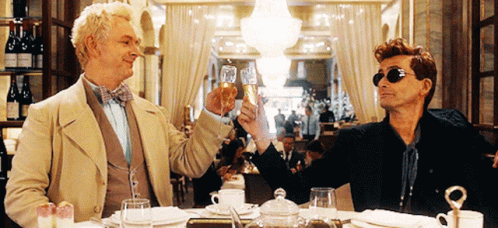
Exactly vs Exactly; AND STILL THE ENDING MAKES SENSE. I have a whole meta HERE about the reason Aziraphale made the decision he did, but I want to talk about it a little bit more. Because it’s the same problem. Their “exactly’s” are different, and neither of them asks the other to explain why.
In this particular case of the ending scene of Season 2, in place of the phrase “exactly” they use the word “together”.
Aziraphale wants Crowley with him in heaven, because they fix things when they’re together. And Aziraphale has faith they they can fix heaven. “We can be together” is how he presents it to Crowley. Crowley rightly sees this as naive, and he’s upset that Aziraphale thinks he wants to be something he’s not anymore.
He finds it hurtful that Aziraphale wants him to change.
“We can go off together” Is what Crowley counters. He says all of this is awful, please let us go off somewhere the danger isn’t. Let me keep you safe. Aziraphale doesn’t want to run away. He wants to save the world again. He wants to save it with Crowley. He wants them both to be good, too.
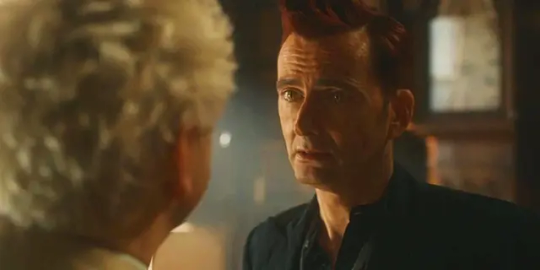
IT’S THE SAME ARGUMENT.
Only Crowley doesn’t let Aziraphale win this time. Aziraphale isn’t right this time. And Crowley isn’t wrong. (I mean I don't think he's right either, they need to find a compromise that isn't the toxicity of heaven and isn't the loneliness of running away.) This time he says, “It’s finally too much, you’re finally asking me to do too much.” Crowley for the first time ever, when asked to make the decision between the two of them, chooses himself. Neither of them explain themselves, and neither of them asks the other to do it either. Because asking questions has always been dangerous for both of them. Anyway, this season makes my brain buzz and I love the ending so much.
#its the “Let me fix it for you” but hearing “Let me fix you for it” dilemma that I said in my Job post#good omens#good omens meta#good omens 2#good omens 2 spoilers#good omens spoilers#go2 spoilers#okay? okay.#but instead its exactly? exactly.#and instead of sweet its actually heartwrenching#I won't stop talking about this EVER
562 notes
·
View notes
Text
I Know Those Eyes Pt 2
why yes i am continuing this
“You’re certain.”
Batman’s words were clipped. Less a question than a threat of consequences. Tim nodded, no hesitation.
“I’d have to have access to a blood or skin sample for 100% confidence, but… yeah. As of 1:23 A.M. this morning, we have confirmed visuals of Lex Luthor and Damian Wayne, alive and mobile, in downtown Gotham City.”
He brought up images of the hotel.
“Hotel Spillane, originally used by the Falcone family, mainly used by the successors of their original business interests. Several legal and executive representatives of one of these interests arrived over the course of the night and previous evening, with Luthor and… Damian being the last to arrive.”
Keep it together, Tim.
“Oracle looked into Luthor’s new identity. It’s so obvious I am actually mad. He’s backstopped a whole life story as Lex Luthor’s estranged twin brother, Lionel V. Luthor, going by the nickname Vlad. Sole inheritor of all Lex Luthor’s assets.”
He brought up the images on file for ‘Lionel’ as well as his own analysis of the footage.
“The confusing part is what he did after inheriting–he has been spending a lot of money on sustainability research, alternative fuels, updated emergency service systems, things like that. As far as I can tell he wants to make premium versions of those things and sell them for a profit, but is playing the long game by flooding the board with cheap goods while gaining good PR.”
He called up the files on VladCo.
“The rest he used to get a tech startup running, VladCo. Apparently he’s interested in ‘standardizing the nonstandard’, whatever that means, but he hasn’t really made anything for the mass market yet. The closest we can find is he’s been making something classified for the U.S. government.”
He took a shaky breath and called up what he had on Damian. He felt Bruce’s pained, shocked exhale more than he heard it, but it was there all the same. So… there really wasn’t any doubt.
“Daniel Summers. On paper he’s 24, was raised in Chicago, and while he’s acting as Luthor’s bodyguard we couldn’t find any official records of him being employed in that capacity. Probably because Oracle was only checking every thirty seconds and his birth certificate didn’t show up on any records until just before they arrived at the hotel.”
He started counting off on his fingers.
“So, 1: whoever is adding them to the system isn’t done yet. 2: they don’t actually care if they get caught. 3: they, very specifically, don’t care if we catch them.”
“You’re saying he’s taunting us.”
“It’s looking–hang on, Oracle says there’s a situation developing.”
One quick shortcut and video of a meeting room popped up on the screen. ‘Lionel’ was smugly facing down his very angry looking investors and their representatives. Suddenly, each of them seemed to calm down. Unnaturally fast, and in unison, with a very particular dull look to their eyes. Tim felt a chill down his spine.
Mind control. Lex Luthor was a meta now, and he had mind control! No wonder Damian hadn’t reached out–
But why? What did he still need Damian for? Unless…
Oh.
He met Batman’s eyes. The taunting, the lack of discretion, finding his first victims in Gotham City.
This was a hostage situation.
***
“You know, badger, you’re perfectly free to walk away from this part of the plan.”
“No, I promised. … still really creepy to watch, though.”
All the papers were signed, all the signatories overshadowed. Now all they had to do was get out of range.
Danny frowned as he saw the receptionist reach for the phone. Right, spy games. Someone was probably supposed to give her a code word when the meeting was over–
Her eyes went glassy, hand freezing around the phone, and seriously that would never stop being creepy to watch. Still, non-violent solution, he’d take it.
As they approached their car, Danny scanned the quiet, ominously lit street. Not for obvious cameras–he knew for a fact Oracle would never allow one to be obvious–but for the best possible angle a camera could have. Eliminating the ones that would have already been used, that left–
He had thought about this moment. How he would give some signal to let them know he was back. That he had been thinking of them.
… Tt. Another time. Too many layers to communicate through, too little space to do so. His gaze had lingered with a purpose, he could only hope that would communicate that Damian was still a part of him too.
For now, that would have to be enough.
***
-major reveal of this chapter: ‘Lex’ has mind control powers
-lol damian/danny is the ghost king, vlad holding him hostage? ha no
-yeah they did not plan the hostage thing but vlad is gonna jump on it with both feet later. like he’s not gonna take credit for it, amirite
-some chapters will be longer. some will be shorter. the main thing is still vibes
-yes, the last little bit is going to make things so much worse with the bats
-why Summers? anything winter-related would be too on the nose, and using a name associated with a very different comic book universe felt appropriate
-i've been a touch stressed so this got put on the backburner. yes, because current events
@hinari @blankliferain @grimdarling69
55 notes
·
View notes
Text

I’ve got so much on my mind! Eva/Neil stuff To the moon beach episode spoilers
While I’ve always liked the Eva/Neil ship I have seen it as more one sided, or maybe just UNdecided. Neil I think it got increasingly obvious that he liked her, but it was hard to tell with Eva. I think in this game she definitely showed Interest in him. peeking at his shirtlessness and whatever’s in his pants at the pool lmao. plus wanting to believe the real Neil would want to protect her and do nice gestures. I think my most satisfying personal interpretation is that she’s just isn’t all that sure how she feels about him besides that obviously, this was her best childhood friend. After all I think it’s hard to have feelings for someone who was so distant and secretive at the same time. But there’s definitely still Something there that just… never got the chance to become something more.
I think a feeling of ‘incompleteness’ is prominent after finishing this game. Somehow having some of the truth confirmed/spelled out to you just leaves me with more questions. And perhaps that’s the whole point… the incompleteness of their feelings for each other, the incompleteness of the beach trip, the incompleteness of the simulated beach trip, the incompleteness of Neil himself as a person. I feel like the life lesson here was that you got to be ok with not having all the closure but realize that things have an end in spite of it. And you’ve got to move on once you’re ready to. The game giving you one final chance to linger on a perfect moment of Neil and Eva at their most vulnerable, letting You choose when the story ends was really profound. It’s like Kan Gao was saying to you ‘yeah, you’ve known all along Neil was dying/is dead. And that this series wasn’t going to last forever. You can keep returning to it again and again, but that fact remains and eventually you will stop playing the games and move on.’
I’m not sure if I’m articulating the metaness of this ending well enough, but Eva and the player feel in parallel here. Eva’s relationship with Neil, and the players relationship to this series.
Just wow. What an incredible ending. It almost felt too quick that the biggest theory of Neil being dead all along was confirmed but, it’s not too quick at all considering this story’s been going on for 13 years I guess. Still leaves me in shock even though that’s honestly what the games have been Strongly hinting at.
Will try to remember To the Moon for as long as I can. What an impactful game series…
#to the moon#rosawatts#to be clear I didn’t draw this it’s a screenshot lol#from the official trailer
70 notes
·
View notes
Note
Okay but imagine being in ZeeNuNew’s shoes - you’re queer, confirmed dating but haters still pair you with women you interact with or just meet (business or not), tell you that you’re not ‘queer enough’ and your relationship that you confirmed years ago must be fanservice and if you tell something like ‘NuNew likes cold showers, I prefer warm/hot ones and it’s torturous for me’ (Zee has said it recently by the way, like days ago) people still act surprised:/ but I hope it’ll be better for them
It's definitely an interesting situation. Because like, coming at it from an outside perspective as I was, I was confused for a while. Over the top fan service is a staple of the genre tbh. But I think maybe people get stuck on the black and white and forget the nuance.
Like yeah, it can be fan service and they can also actually care for each other. Which is where I ended up. Because they were definitely playing it up, especially at the beginning of the relationship, but you can also see the genuine affection and emotional honesty, and you can see how it shifts over time.
Again, so wild to me that it's like living your own fake dating au. Committing to the bit to the point where it's no longer a bit. It sounds like a bl plot. (I mean DMD is literally doing a bl with that plot right now lol) That's so meta.
I think people are naturally skeptical, and I think that's probably for a good reason, as it's always best to keep yourself self aware when it comes to celebrities. But what's weird is the intensity with which people are either "pro" or "anti."
As if it's a matter that affects them personally. Like, if they are "pro" and proven wrong true love doesn't exist and they were fools all along and if they are "anti" and they're wrong they were hateful homophobic crones. When like. We are not part of the equation. But people are dedicating themselves to their stance so fully. Which is why I think I was going back and forth for a while before just being like ¯\_(ツ)_/¯
They are or are not whatever they are. They're cute as hell and act like a couple so that's the assumption I'm gonna live under.
You know the whole "if it walks like a duck and talks like a duck, it's probably a duck" thing?
I don't shower with my bros.
But instead of being like "hey, I change my mind once I've encountered new information" people double down in weird and frankly, queer phobic ways.
I can understand the confusion about their label because I understand it's a bit different culturally. Like, in a western sense most people would not consider it a confirmation because it was more of a "make your own assumptions" kind of thing. Which was what tripped me up for a while.
Tbh that would be the best possible response if it were secretly all fan service all along somehow. Because then that would give people the feeling of confirmation they want while still having the deniability of "I never actually said that."
But also, given the untraditional nature of their relationship, labels like that, especially at the time, may have just not been something they were worrying about. Like, I don't think there's a guidebook for this whole situation.
Sidenote: I am so charmed by the epic saga that is them vs showers.
Especially how Nunew likes to tease about Zee's snoring vs Zee teasing Nunew about his bad habit of not showering before bed. (But it's ok if Nunew does it because Nunew is always the exception it seems. Something the besties have in common. Nat is always the exception for Max.)
The shower ghost, etc. it's peak old married couple bickering.
Kind of like for whatever reason what convinced me about earthmix (on top of everything else) was that Mix pops Earth's zits. Like. That's a level of intimacy that simple costars do not have lmao.
When it's not just the cute shit, but also the gross stuff and the every day bickering that makes it feel genuine.
#zeenunew#i just think they're cute. like.#they've been going hard lately. idk what got into them but im here for it.#i saw a gossipy comment about what nunew did in a concert recently that was like#“if that man doesnt pop the question nunew is about to do it himself” and that i mean. yeah i could see it lol.#i amso hope though. that like. they get more time to just chill and be alone soon.#i know they're very busy and their careers are very important to the both of them.#and they're very showy with their type of affection. which is I think is probably a part of why they work.#and i personally love the little mood boost i get from those two being cute. but i think they deserve a vacation.#sidenote sidnote: dor real when i saw the pimple popping and sheet farts videos (re earthmix) i was like. “yeah. thats some true love shit.”#more than co-parenting 9 cats. i would not put up with that lmao.#i dont know a lot about Buddhism but i know they're always doing couple things at the temple together#sidenote sidenote sidenote: considering it's a non theistic religion. do people still culturally say “oh my god/s”#i think ive seen it a few times but not a lot.#ssk tag#i got distracted
44 notes
·
View notes